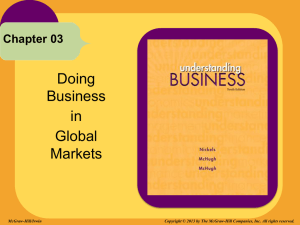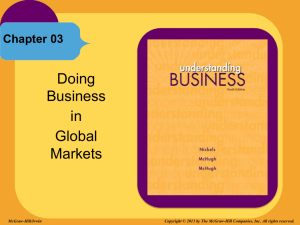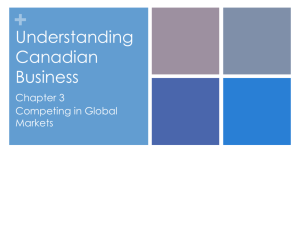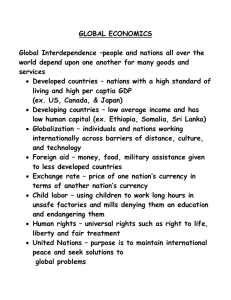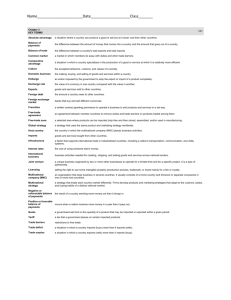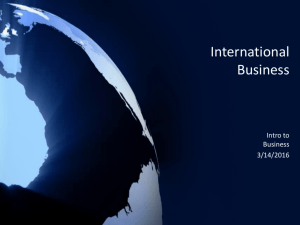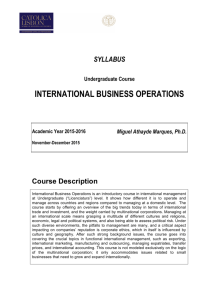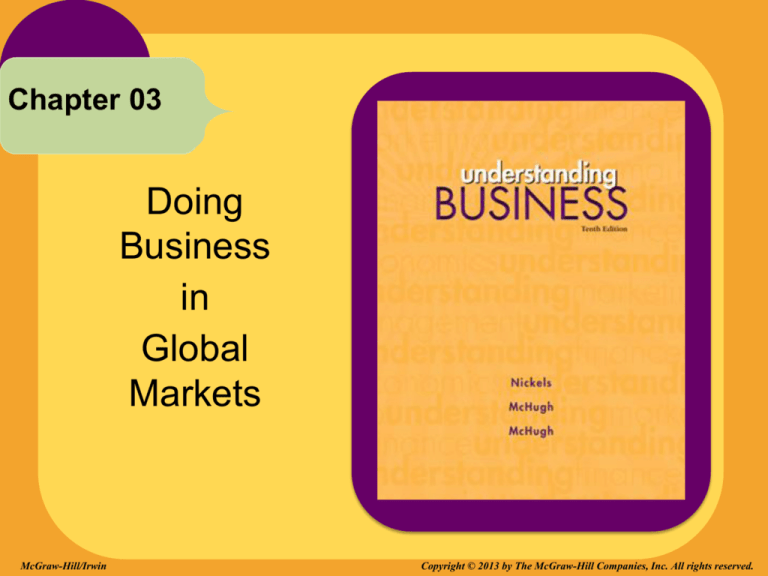
Chapter 03
Doing
Business
in
Global
Markets
McGraw-Hill/Irwin
0
Copyright © 2013 by The McGraw-Hill Companies, Inc. All rights reserved.
3-2
Why Trade With Other Nations?
• Global trade allows countries
to produce what they make
best and buy what they
need
not used
from others.
3-3
3-4
TRADING with OTHER NATIONS
• Countries with abundant natural resources (like
Venezuela or Russia) need technological
resources from other countries (like Japan).
3-5
HOW FREE TRADE
BENEFITS the WORLD
Global trade has led the world in a new direction:
• Literacy rates worldwide have increased from
56% in 1950 to 99% in 2012.
• Life expectancy in less developed areas rose
from 40.9 years in 1950 to 70.5 years in 2012.
Source: The World Bank, June 2014
3-6
Company % of
Earnings From Outside U.S.
Company
Total Assets Reinvested
Overseas in 2011
Total Assets Reinvested
Overseas in 2012
Total Added in 2012
GENERAL ELECTRIC CO
$102,000
$108,000
$6,000
PFIZER INC
$63,000
$73,000
$10,000
MICROSOFT CORP
$44,800
$60,800
$16,000
MEREC CO
$44,300
$53,400
$9,100
JOHNSON & JOHNSON
$41,600
$49,000
$7,400
INTL BUSINESS
MACHINES CORP
$37,900
$44,400
$6,500
EXXON MOBIL CORP
$47,000
$43,000
-$4,000
CITIGROUP INC
$35,900
$42,600
$6,700
CISCO SYSTEMS INC
$36,700
$41,300
$4,600
APPLE INC
$23,400
$40,400
$17,000
http://online.wsj.com/news/interactive/FORCASH20130311?ref=SB10001424127887324
034804578348131432634740
3-7
PLEASURE DOING BUSINESS
Best Countries for Business out of 183 Countries
Economy
Ease of Doing Starting a Paying
Business Rank Business Taxes
Singapore
Hong Kong SAR, China
New Zealand
United States
Denmark
Malaysia
Korea, Rep.
Georgia
Norway
United Kingdom
1
2
3 .
4
5
6
7
8
9
10
3
5
1
20
40
16
34
8
53
28
5
4
23
64
12
36
25
29
17
14
Trading
Across
Borders
1
2
21
22
8
5
3
43
26
16
© 2013 The World Bank, All Rights Reserved
3-8
3-9
CAN YOU SPARE A DIME?
Rank
Name
Net Worth
Age
Source
Country of
Citizenship
1
Carlos Slim
Helu & family
$73 B
74
telecom
Mexico
2
Bill Gates
$67 B
58
Microsoft
United States
3
Amancio
Ortega
$57 B
77
Zara
Spain
4
Warren Buffett $53.5 B
83
Berkshire
Hathaway
United States
5
Larry Ellison
$43 B
69
Oracle
United States
6
Charles Koch
$34 B
78
diversified
United States
6
David Koch
$34 B
73
diversified
United States
8
Li Ka-shing
$31 B
Liliane
Bettencourt & $30 B
family
Bernard
Arnault &
$29 B
family
85
diversified
Hong Kong
91
L'Oreal
France
64
LVMH
France
9
10
Forbes 2014
3-10
Why Trade with
Other Nations?
LG1
TRADING with OTHER NATIONS
• Countries with abundant natural resources
(like Venezuela or Russia) need technical
resources from other countries (like Japan).
• Global trade allows countries to produce
what they make best and buy what they need
from others.
• Free Trade – The movement of goods and
services among nations without political or
economic barriers.
3-11
TRADING with OTHER NATIONS
Theories of Advantage
Comparative
Absolute
3-12
COMPARATIVE ADVANTAGE
• Comparative Advantage -- A country
should sell the products it produces most
efficiently and buy from other countries
the products it cannot produce as
efficiently.
3-13
Theories of Advantage
Comparative
U. S.
China
China
Software
3-14
U. S.
Clothing
ABSOLUTE ADVANTAGE
• Absolute Advantage -- A country has a
monopoly on producing a specific
product or is able to produce it more
efficiently than all other countries.
3-15
Theories of Advantage
Absolute = Virtual Monopoly
South Africa
The Rest of
the World
Diamond Production
3-16
IMPORTING and EXPORTING
• Importing -- Buying products
from another country.
• Exporting -- Selling products
to another country.
• The U.S. is the largest
importing nation in the world.
3-17
MEASURING GLOBAL TRADE
3-18
HOW to MEASURE GLOBAL TRADE
• Balance of Trade -- The total value of a nation’s
exports compared to its imports measured over
time.
• Trade Surplus -- When the value of a country’s
exports is more than that of its imports.
• Trade Deficit -- When the value of a country’s
exports is less than that of its imports.
3-19
Rising U.S. Trade Deficit
http://www.americaneconomicalert.org/ticker_home.asp
3-20
Source: US Dept of Commerce, Bureau of Economic Analysis
GETTING INVOLVED in
EXPORTING
• Exporting provides a
great boost to the U.S.
economy.
• It is estimated, every
$1 billion in U.S. dollars
exported generates
over 7,000 U.S. jobs.
3-21
BALANCE of PAYMENTS
• Balance of Payments -- The difference between
money coming into a country (from exports) and
money leaving the country (from imports) plus other
money flows.
• The goal is to have more money flowing into a
country than out – a favorable balance.
• An unfavorable balance is when more money
flows out of a country.
3-22
UNFAIR TRADE PRACTICES
• Dumping -- Selling products in a foreign country at
lower prices than those charged in the producing
country.
• Dumping is prohibited in the U.S.
• China, Brazil and Russia have been penalized
for dumping steel in the U.S.
3-23
KEY STRATEGIES for REACHING
GLOBAL MARKETS
Licensing
Least
Exporting
Franchising
Contract
Manufacturing
International
joint ventures
and strategic
alliances
Amount of commitment, control, risk and profit potential
Foreign
direct
investment
Most
3-24
LICENSING
• Licensing -- When a firm (licensor) provides the
right to manufacture its product or use its trademark
to a foreign company (licensee) for a fee (royalty).
• Licensing can benefit a firm by:
- Gaining revenues it wouldn’t have otherwise
generated.
- Spending little or no money to produce or market
their products.
3-25
EXPORT ASSISTANCE CENTERS
& EXPORT TRADING CENTERS
• EACs provide hands-on exporting assistance
and trade-finance support for small and mediumsized businesses that wish to directly export
goods and services.
• ETCs help companies engage in indirect
exporting by:
- Matching buyers and sellers.
- Dealing with foreign customs offices,
documentation, and conversions.
3-26
HOW EXPORTS
AFFECT the GDP
Source: Bloomberg Businessweek, November 22, 2011.
3-27
HOW EXPORTS
AFFECT the GDP
Source: Bloomberg Businessweek, November 22, 2011.
3-28
HOW EXPORTS
AFFECT the GDP
Source: Bloomberg Businessweek, November 22, 2011.
3-29
GOING GLOBAL with a
SMALL BUSINESS
• Small businesses may be the key in global job
growth.
• Only 1% of U.S. small businesses export, yet
they account for 30% of total U.S. exports.
• President Obama
wants small
businesses to help
double exports by
2015.
3-30
FRANCHISING
• Franchising -- A contractual agreement whereby
someone with a good idea for a business sells
others the rights to use the name and sell a
product/service in a given area.
• Franchisors need to be careful to adapt their
product to the countries they serve.
• Pizza Hut and Dominos learned that pizza
topping preferences differ all around the world.
3-31
What’s On Your Pizza
•
•
•
•
•
•
•
Costa Rica - Coconut
France - Bacon, onion and fresh cream
India - Pickled ginger, minced mutton and tofu
Australia - Shrimp and pineapple
Pakistan - Curry
Brazil - Green peas
Japan - Squid and mayo jaga
Source: World Features Syndicate
3-32
GOLDEN ARCHES GLOWING
ACROSS the GLOBE
• McDonald’s has more than 32,000 restaurants in
over 117 countries.
• Maintains varying menus around the world due to
the different preferences of its customers.
• Responds to challenges
by funding research and
adding healthier options.
3-34
THAT’S at MCDONALD’S?
• Malaysia: Bubur Ayam McD – Chicken strips in porridge
with onions, ginger, and shallots.
• Egypt: Mcarabia “Grilled Kofta” - Two grilled Kofta
patties with lettuce, tomatoes, onions and tehina sauce
folded in Arabic bread.
• Japan: Teritama – Teriyaki burger topped with an egg.
• Germany: Want a beer with your burger? You can order
one in the German stores.
• Israel: Operates using Kosher kitchens.
Source: McDonalds, www.mcdonalds.com, March 2014.
3-35
CONTRACT MANUFACTURING
• Contract Manufacturing -- A foreign company
produces private-label goods to which a domestic
company then attaches its own brand name or
trademark. A form of outsourcing.
• Contract manufacturing can be used to:
- Allow a company to experiment in a new market
without incurring heavy start-up costs such as
building a manufacturing plant.
- Temporarily meet an unexpected increase in
orders.
3-36
JOINT VENTURES
• Joint Venture -- A partnership in which two or more
companies join to undertake a major project.
• The Benefits of Joint Ventures:
- Shared technology and risk.
- Shared marketing and management expertise.
- Entry into markets where foreign companies are
often not allowed unless goods are produced
locally.
3-37
STRATEGIC ALLIANCES
• Strategic Alliance -- A long-term partnership
between two or more companies established to help
each company build competitive market advantages.
• Strategic alliances
don’t typically share
costs, risks,
management or profits.
• Strategic alliances
provide broad access
to markets, capital and
technical expertise.
3-38
FOREIGN DIRECT INVESTMENT
• Foreign Direct Investment (FDI) -- The buying of
permanent property and businesses in foreign
nations.
• Foreign Subsidiary -- A company owned in a
foreign country by another company called the parent
company. The most common form of FDI.
- Primary Advantage: Parent company maintains
complete control over its technology or
expertise.
- Primary Disadvantage: Must commit funds and
technology within foreign boundaries.
3-39
WHERE DO THEY INVEST?
Leading Foreign Destination Investors
© 2013
3-40
MULTINATIONAL CORPORATIONS
• Multinational Corporation -- A company that
manufactures and markets products in many
different countries and has multinational stock
ownership and management.
• Not all large global businesses are multinational.
• Only firms that have manufacturing capacity or
some other physical presence in different
nations can truly be multinational.
3-41
Forces Affecting
Trading in Global
Markets
LG4
FORCES AFFECTING
GLOBAL TRADE
• Socio-cultural
• Economic and
Financial
• Legal and
Regulatory
• Physical and
Environmental
3-42
CULTURAL DIFFERENCES
• To be involved in global trade, you must be
aware of the cultural differences among nations
including:
-
Social Structures
Religion
Manners
Values
Language
Personal
Communication
3-43
LOST in TRANSLATION
Advertisements Gone Wrong
• Braniff Airlines’ slogan "Fly in leather” translated
in Spanish as "Fly naked.”
• Gerber used their U.S. label – a cute baby – on
African products. They found out that labels on
African products picture what’s inside the
package.
• In Italy, Schweppes Tonic Water was mistaken
as Schweppes Toilet Water.
3-44
READY to TRAVEL ABROAD?
Know Your Cultural Differences
• In Turkey, it’s rude to cross your arms while facing
someone.
• In many Middle Eastern countries, you shouldn’t eat
or shake hands with the left hand because it is
considered unclean.
• In India, you should never pat anyone’s head. It’s
where their soul is kept.
• In Brazil, your meeting may not start on time because
punctuality isn’t important to the culture.
3-45
DO as the GERMANS…
How to Not Embarrass Yourself in Germany
• Always use titles like Doctor, Frau, or Herr.
• Always provide food and drinks for your birthday.
• Don’t remove your jacket until your host does.
• Wear conservative business attire, anything else is
considered sloppy.
• Never jaywalk.
• Always keep your hands on the table when eating.
3-46
EXCHANGE RATES
• Exchange Rate -- The value of one nation’s
currency relative to the currencies of other
countries.
• High value of the dollar – Dollar is trading for more
foreign currency; foreign goods are less expensive.
• Low value of the dollar – Dollar is trading for less
foreign currency; foreign goods are more expensive.
• Currencies float in value depending on the supply
and demand for them in the global market.
3-47
DEVALUATION and
COUNTERTRADING
• Devaluation -- Lowers the
value of a nation’s
currency relative to
others.
• Countertrading -Complex form of
bartering in which several
countries each trade
goods or services for
other goods or services.
3-48
LEGAL CONCERNS OVERSEAS
• There’s no global system of laws.
• Laws may be inconsistent.
• U.S. businesses must follow U.S. laws while
conducting global business.
• The Organization for Economic Cooperation and
Development (OECD) and Transparency
International fight to end corruption and bribery
in foreign markets and have had limited
success.
3-49
ENVIRONMENTAL FORCES
• Developing countries
have transportation and
storage systems that
make international
distribution difficult or
impossible.
• Often, technological
capabilities are far from
those in the U.S. which
make for a tough
business environment.
3-50
TRADING with OTHER NATIONS
• Free Trade -- The movement of goods and
services among nations without political or
economic barriers.
3-51
TRADE PROTECTIONISM
• Trade Protectionism -The use of government
regulations to limit the
import of goods and
services.
• Advocates of
protectionism believe it
allows domestic
producers to survive,
grow and produce jobs.
3-52
TARIFFS
• Tariffs -- Taxes on imports.
• Two kinds of tariffs:
-
Revenue – Raise money
for governments.
Protective – Raise the
retail price of imports so
domestic goods are
competitively priced.
3-53
IMPORT QUOTAS and EMBARGOS
• Import Quota -- Limits the number of products in
certain categories a nation can import.
• Embargo -- A complete ban on the import or export
of a certain product or the stopping of all trade with a
particular country.
• Political disagreements can lead to embargos,
like the U.S. embargo against Cuba.
3-54
WORLD TRADE ORGANIZATION
• General Agreement on Tariffs and Trade -A global forum for reducing trade restrictions on
goods, services, ideas and cultural problems.
• World Trade Organization (WTO) -Headquartered in Geneva, the WTO is an
independent entity of 152 member nations whose
purpose is to oversee cross-border trade issues and
global business practices.
3-55
COMMON MARKETS
• Common Market -- A regional group of countries
with a common external tariff, no internal tariffs and
coordinated laws to facilitate exchange among
members.
• The European Union (EU), Mercosur and the
ASEAN and COMESA are common markets.
3-56
EU MEMBERS
3-57
NAFTA
• North American Free Trade Agreement -Ratified in 1994, created a free-trade area among
the United States, Canada and Mexico.
• NAFTA’s objectives are:
-
-
Eliminate trade barriers and facilitate cross-border
movement of goods and services.
Promote conditions of fair competition.
Increase investment opportunities.
Provide effective protection and enforcement of
intellectual property rights.
Establish a framework for further regional trade
cooperation.
Improve working conditions in North America.
3-58
CAFTA
Central American Free Trade Agreement -Passed in 2005, created a free-trade zone with Costa
Rica, Dominican Republic, El Salvador, Guatemala,
Honduras and Nicaragua.
• Free traders hope CAFTA will lead to the creation
of a Free Trade Area of the Americas (FTAA).
3-59
NEW FREE
TRADE AGREEMENTS
• Today, free trade
agreements are being
negotiated with South
Korea, Colombia and
Panama.
• The U.S. is considering
an agreement with a
nine-nation free trade
bloc called the TransPacific Partnership.
3-60
FUTURE of GLOBAL TRADE
• With over 1.3 billion people, China has
transformed the world economic map. Many
multinationals invest heavily in China.
• India has seen huge growth in information
technology, pharmaceuticals and biotechnology.
• Russia is a large oil producing country with many
multinationals interested in developing there.
• Brazil is expected to be one of the wealthier
economies by 2030.
3-61
OUTSOURCING
• Outsourcing -- Process by which a firm contracts
with other companies to do some or all of its
functions.
• U.S. firms have outsourced payroll functions,
accounting and manufacturing for years.
• With the growth of global
markets, companies have
been shifting to offshore
outsourcing – outsourcing
with other countries.
Photo Courtesy of: Vitor Lima
3-62
3-63
3-64

